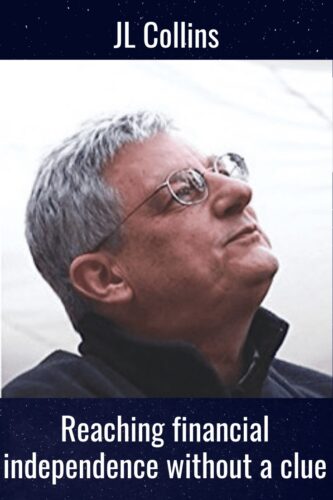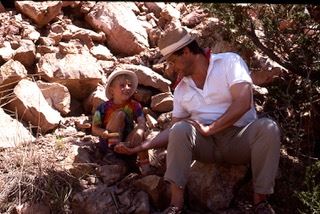Deze blogpost is bij wijze van uitzondering in het Engels, omdat ik de Engelstalige JL Collins als gast heb. Alle andere blogposts op dit blog zijn in het Nederlands. Hier vind je een overzicht van alle posts tot nu toe.
JL Collins: reaching financial independence without a clue
By exception, this blog post is in English instead of Dutch. For a reason, as I am very pleased to have JL Collins as a guest!
He is best known for…
- The Stock Series
- His best selling book The Simple Path to Wealth (more than 100.000 copies sold)
- And for creating the annual week long FI (Financial Independence) retreats called Chautauqua
Next to that, I expect him to become known for “A Guided Meditation for when the Stock Market is dropping” (please read on to find out)
During his recent visit to The Netherlands, Mr and Mrs Cheesyfinance and I had the privilege to have an extended lunch meeting with him and his lovely wife Jane.
Inspiring as I found it, I thought it might be interesting to have him as a guest on my blog. And as he thought this could be fun, he kindly accepted my invitation! So, here we go, Q&A style:

Hi all, JL Collins here…
Who would you like to meet and why?
It is great fun meeting “Chautauquans” and those people on the FI path who choose to come to one of my meet-ups as I travel the world.
I would have loved to meet Jack Bogle, founder of Vanguard and creator of the index fund. But he has passed away.
He did, in one of the great moments of my life, send me an email about my book.
Furthermore, I would like to meet Neil deGrasse Tyson and Ricky Gervais.
Index investing
How did you first learn about index investing?
Jack Bogle, the founder of Vanguard, created the first index fund in 1975. As it happens, 1975 was also the first year I started investing.
Unfortunately, indexing was slow to catch on and I didn’t hear about it until ~1985.
Then I was slow to catch on. Sigh.
It took me another 10-15 years before I fully accepted the value and power of broad-based index funds.
Who taught you the most about investing?
My many, many mistakes.
What are your biggest mistakes you ever made with investing?
The biggest mistake was how long it took me to accept and embrace indexing.
In my experience, many smart people in investing are slow to accept indexing. I even wrote a post about some of the reasons why
How do you expect long term future gains from the stock market to be compared to the results from the past?
There is always a lot of nonsense being written predicting what the stock market will do.
About three years ago I stated seeing gurus claiming we had to expect ~4% annual returns for the next ten years.
They have all kinds of wonderful reasons that seem to make perfect sense. Of course, the past three years have been very strong, so the next seven need to be very bad for this particular prediction to work out. LOL
Could returns for the next decade average ~4% a year? Sure.
Or, we might be on the verge of a new technological revolution built around solving things like climate change and plastic waste that will make the next ten years the strongest in history.
Beats me. I don’t know.
Nobody does. The difference is I know I don’t know, and I don’t try to claim otherwise.
Nobody can predict what the market will do. There is an old saying: “The market will do whatever it takes to embarrass the largest number of people.”
But there are thousands of people out there making predictions. It is key to remember that, at any given point in time, someone is predicting every possible thing the market could possibly do.
This, of course, means that some of them will be right.
They, and the media around them, will then claim their unique metrics work and they can continue to foresee the future.
Nonsense.
You need to recognize this as the sheer dumb luck it is. Nothing more.
When you read about how someone won the lottery, you don’t think, “There’s a person who has figured out how to pick winning lottery numbers.”
At least, I hope you don’t.
Instead, you recognize sheer, dumb luck when you see it.
Emotions can be your worst enemy when investing. How do you think people can best deal with emotions when investing?
Emotions are at their highest and most dangerous when the market is taking one of its periodic and perfectly natural plunges.
In my approach, we recognize these are impossible to predict and we just stay the course and ride out the storm.
Easy to say, very hard to do.
You must decide now, while things are calm, what you are going to do: Nothing. You should stay the course and do nothing. You must tie yourself to the mast when the storm begins to rage.
This is so important I wrote a whole post about it.
This might be the most important post I have ever written.
If you read that post and decide that you would panic and sell, and that therefore my investing approach is not right for you: Good!
It is incredibly important to know yourself. If my approach isn’t a good fit for you, there are others.
This is a guest post on one that is the complete opposite of mine
You wrote your famous Stock Series as guidance for your daughter. How did that work out for her? Any advice for young parents on how to guide kids on the topic of investing?
I did.
When she was young, I pushed this stuff too hard and turned her off to it.
The blog and the Stock Series and the book were all written as ways to archive this information for when she was ready to hear it.
She has come around, and at age 27 is on the FI path. And the blog, book and Chautauquas have been wonderful additions to my life.
Now she teases me that, had she listened when she was young, I would have none of it. She’s right.
Financial independence
How did you get in touch with the topic of FIRE?
In 2011, when I started the blog, I had no idea there was such a thing as pursuing FI.
When I started my journey in 1975, I was just doing what felt right to me. But, of course, it put me massively out of step with the world around me.
There were no blogs or books about this stuff. No internet, for that matter. No way to connect with others who might be on the same journey.
It was wandering in the wilderness.

When did you achieve financial independence?
1989, but I had no idea at the time.
When did you first realize you were financially independent?
From 1989 to 1995 my wife and I were taking unpaid sabbaticals. Our daughter was born in 1992.
As I did at the end of every year, I totaled up our assets. About three years in, I noticed something remarkable.
Every year we spent the same amount of money as in the past and we had no income. Yet, at the end of each year, we were worth more than we had started with.
Embarrassingly, the implications of this realization — namely this meant I never had to work again — didn’t occur to me. I simply had no frame of reference.
I had no concept of FI and it certainly wasn’t a goal.
I liked my career and I liked working. I simply didn’t like doing it all the time. I liked having what I called “F-you money” which allowed me to step away whenever I chose. But I always intended to go back to work when the time came and I felt ready.
Did you experience any form of one-more-year syndrome during the last stages of your working career?
As you might guess from my answer above, I never did the RE (retire early) part of FIRE. I might have if I had been aware of the concept, and sometimes I wonder about it.
But my approach was to work until I got tired of the job, step away for a few months or years, and then go back refreshed and ready for a new challenge.
The only job I ever quit with the idea of never working again was in 2011. I was 60 at the time, hardly an “early” retiree.
Even then, I started the blog, and then Chautauquas and then wrote the book. This all slowly grew into a little business and by 2016 it was actually making money.
You might say that while I figured out the “FI” part early and well, I never did figure out the “RE” part. Or, at my age, even just the “R” part.
What does a typical FIRE day/week/month/year look like for you?
Even though I now have this small business around my blog, life is pretty sweet.
I work on the blog as much or as little as I please. It is mostly self-sustaining.
We travel the world and do pretty much whatever we chose each day. Except when I agree to write guest posts like this one.
My only complaint is that, at my age, I don’t have the energy to take full advantage of all the resources and opportunities available.
Being an owner of a holiday house only, what is your take on owning (or not owning) a house?
The post on my blog that generates both the most hate and the most love is this one.
But I am not anti-house. I am simply anti believing all the industry propaganda that it is a great investment.
Sometime it is, but most often, if FI is your goal, renting is the better option. But to really know, you have to run the numbers.
Truth is, I’ve owned and lived in houses most of my adult life. But I was never silly enough to think of them as investments, let alone good ones. They were lifestyle choices and I always made choices I could easily afford.
Once our daughter went off to university, we promptly sold the house and returned to the carefree life of renting.
A few years after that, we realized that for most of the year we were gone and the apartment was essentially expensive storage. So, we gave it up and began traveling full-time.
Then we stumbled on a beach house in an especially beautiful spot on Lake Michigan. We call it Kibanda.
We spend a few months a year there now and rent it in the summer. So, it pays for itself.
Still, we are now thinking of selling it. Life would be simpler without it. We’ll see.
For those interested I have a series of Kibanda posts with more details. This is the first.
What differences do you see between the US and The Netherlands for people on their way to FIRE?
Understanding that I have only a superficial understanding of taxes, benefits and incomes in The Netherlands, my impression is that it is a tougher journey here than in the US. Plus, you have a much more robust safety net and so perhaps don’t feel the same need or motivation to seek FI.
Do you expect the FIRE way of living to become a true mainstream alternative to the neoliberal consumerism society that is dominant these days in the Western World? Why?
Most people in the FIRE community seem to think this approach to life is going to sweep over the world. They find it so beneficial on so many levels, it is hard to see this not happening once people hear about it.
For my part, and I am an outlier on this, I think we are destined to continue to be unicorns.
While the FIRE movement has grown dramatically since I started my blog in 2011, it is still a drop in the vast ocean of mainstream consumerist society.
The sheer volume of marketing money, spent by companies to promote spending to buy their products, dwarfs all the FI blogs, books and podcasts out there.
I hope I’m wrong. But I doubt it.
What is your advice to people just started on their way to financial independence?
It is your money and you can spend it however you like.
Personally, for me there was nothing money could buy that was more important than my freedom. Of course, you buy your freedom by buying investments.
The more “must haves” (houses, cars, clothes, entertainments) in your life other than your freedom, the less likely you are to ever become FI.
Investments don’t have to be the only thing you buy, but if they are not the most important you are not likely to become FI.
Research into human happiness is pretty clear. It has very little to do with buying stuff.
So, give up the idea that pursuing FI is deprivation. It is a privilege, and one not available to most people at any other time in history.
Which are your favorite websites?
Lots of great ones out there, but these are the ones where I read every post:
Wait, but Why (not about FIRE, but very cool)
The new documentary:
Playing with FIRE, is very well done.
Could you recommend any books as further reading material to people interested in financial independence and/or index investing?
Jack Bogle’s books on indexing
Quit Like a Millionaire (Mr FOB: very nice foreword by JL Collins!)
Hotel Sweet Home (about hotel living, my current lifestyle)
Two Non-FI favorites:
How I Found Freedom in an Unfree World (this is the book that most influenced how I live my life)
Sapiens (how and why we evolved into the creatures we are)
As JL Collins is currently traveling, he will not be able to respond to comments just now. For most questions, he has already covered the topic on his blog. Using the Search button on his blog might very well provide the answer.




Geef een reactie